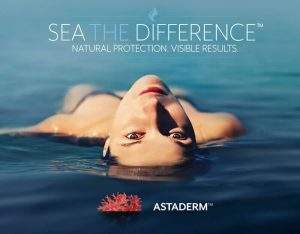3 On-Trend Claims of Marine Algae Skincare Products

And one of the most popular ingredients to stand out in this sudden tsunami of marine-based cosmetic, skincare, and personal care products? Red marine algae. This current craze for marine algae can be linked to three ultra-trendy key claims: sustainability, waterless beauty, and the superfood trend.
Sustainability
Consumers today are increasingly concerned about the sustainability of their beauty and skincare purchases. 42% of North American consumers will buy socially responsible brands, according to GlennCorp, and 73% of Millennials are willing to pay more for sustainable goods, according to Nielsen and Inc. Magazine. For formulators, this means highly sustainable ingredients like red marine algae have the potential to become the key claim of new products.
Just how sustainable is marine algae? According to the Forbes article “See How Algae Could Change Our World, marine algae could be a “silver bullet” to solving several global environmental issues.
“What’s so great about algae? It grows 10 times more rapidly than terrestrial plants, and less than a tenth of the land is needed to produce an equivalent amount of biomass. It grows on non-productive and non-arable land, so it doesn’t compete with other crops for land. Because it doesn’t require fresh water, it can be fertilized more efficiently than land crops, and you can avoid the intensive water usage, wasteful fertilizer runoff, and downstream eutrophication associated with modern agriculture.” – “See How Algae Could Change Our World,” Forbes.
Plus, with recent research by NCBI and heaps of glowing press about marine algae from publications as diverse as the beauty website Refinery29 to American Scientist, it’s obvious the sustainability claim of marine algae will only continue to grow in prominence and familiarity for consumers.
For formulators and consumers seeking out more sustainable beauty ingredients, marine algae is one of the most eco-friendly solutions on the planet.
Waterless beauty
Waterless beauty is the push for “beauty brands to be less wasteful with water when producing their products.” And with the UN predicting as many as 5.7 billion people potentially dealing with water scarcity in 2050, saying no to H2O is more important than ever to many personal care consumers.
However, water plays a critical role in many personal care and skincare formulations. Water provides hydration and moisture to the skin, dissolves skin-benefitting ingredients in products, and forms emulsions of oils and water to form the base of many lotions, moisturizers, creams, and serums. But, luckily for concerned formulators and consumers alike, marine algae can be the perfect ingredient to fulfill water’s vital role in cosmetic products.
Marine algae has long been used in a powder or gel form for a variety of anti-aging and moisturizing products, treatment gels, serums and creams, facial cleansers, masks, acne products, lip balms, and suncare, thanks to its variety of bioactive compounds. Additionally, since marine algae is a natural humectant and draws water into the skin, it’s an excellent option for replacing more traditional, water-intensive humectants in formulations.
For products that need to supply moisture and hydration, or use less water during the manufacturing process, marine algae is a perfect hero ingredient.
Subheadline here…
Lorem ipsum dolor sit amet, consectetur adipiscing elit, sed do eiusmod tempor incididunt ut labore et dolore magna aliqua. Ut enim ad minim veniam, quis nostrud exercitation ullamco laboris nisi ut aliquip ex ea commodo consequat. Duis aute irure dolor in reprehenderit in voluptate velit esse cillum dolore eu fugiat nulla pariatur. Excepteur sint occaecat cupidatat non proident, sunt in culpa qui officia deserunt mollit anim id est laborum.
Lorem ipsum dolor sit amet, consectetur adipiscing elit
Superfood qualities
The third claim driving the popularity of marine algae products is the superfood beauty trend. Superfoods are especially nutrient-rich foods that are considered to have maximal benefits for human health – and appearance. Today, superfoods have made their way from the dinner table to consumers’ beauty products.
“With more consumers thinking about their food as medicine, it should come as no surprise that many of the ingredients consumers are looking for in natural beauty come from emerging food trends. Superfoods like coconut oil and quinoa, which first emerged as food trends, are now starting to show up in beauty and personal care items. But it seems like the time between when a trend emerges in food and jumps over to beauty is condensing tremendously.” — Nielsen.
Red marine algae is a natural fit for superfood-claim beauty products, as it’s packed with beneficial vitamins, minerals, and proteins that promote and protect the skin’s health and vitality.
Red marine algae contains naturally high Vitamin A content, which is helpful for reducing wrinkles, a high Vitamin B content, which evens out skin tone, and Vitamin E, which protects against free radicals. Additionally, red marine algae contains high amounts of calcium, copper, and iodine, all of which work to repair and rejuvenate skin cells and maintain collagen and elastin levels.
Trending yet timeless
For formulations that are designed for capitalizing on the sustainable, waterless, or superfood beauty trends, red microalgae is probably the ultimate ingredient for taking full advantage of these movements, as delivered in natural, multi-functional, skin-active forms like Astaderm™.







